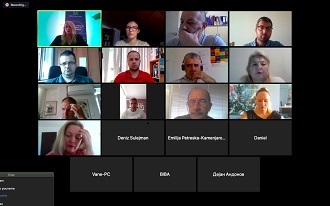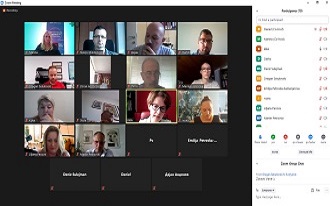On behalf of the project supported by the Canada Fund for Local Initiatives via the Canadian Embassy, within the framework of which the debate was held, the Executive Director of CMEM, Ms. Marina Tuneva highlighted that ‘Reporters Without Boarders’ within the World Press Freedom Index valid for this year indicate that the forthcoming decade shall be decisive for the future of journalism and that the COVID-19 pandemics shall further pronounce and aggravate the multitude of crises jeopardizing the right to free reporting and presenting unbiased, varied and credible information. In the opinion of ‘Reporters Without Borders’, there is a clear distinction between the suppression of media freedom as a response to the Coronavirus pandemics and the ranking of a given country in the World Press Freedom Index.
Ms. Tuneva briefly elaborated on some of the most commonly reported problems by the neighboring countries when it comes to the impact of the crisis on media reporting. Some of these problems are as follows:
- Priority is given to analysts and creators of public opinion who are neither experts in the field of public health nor physicians and occasionally represent a certain side in the argumentation depending on given political interests. Hence, the journalists and experts that investigate into or criticize the measures adopted by the government are subject to allegations of raising alarm.
- Press conferences are held on a daily basis but yet the questions posed by the journalists remain unanswered. The responses to the requests provided by the institutions are rather delayed and the reason for this is prescribed to the state of emergency. Daily online press conferences are organized, but, yet not all journalists are given equal treatment and a multitude of questions remain unanswered.
- The stories of major cases of corruption revealed by the investigative journalists do not reach the ‘mainstream’ media unless such media get engaged in defending certain competent bodies thus leading to accusations of journalists.
The Executive Director of CMEM reminded the attendees of the statement made by the United Nations High Commissioner for Human Rights, Ms. Michelle Bachelet indicating that certain countries have taken advantage of the crisis as an excuse for restriction of information and suppression of criticism, resorting even to arresting and intimidation of journalists. According to Ms. Bachelet the statements made by certain political leaders were aimed against journalists, which is by no means acceptable, due to the fact that free media are indispensable at all times, and now more than ever before.
The President of the Appeals Commission within CMEM, Mr. Mirche Adamchevski elaborated on the challenges encountered by the Council of Media Ethics of Macedonia and on the most common reactions to media reporting.
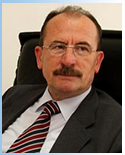
Since the outbreak of the very first Coronavirus case in our country, on February 27th, CMEM released its statement requesting ‘prudent and responsible reporting concerning the Coronavirus’. Appeals were made to media to act in a professional and ethical manner and to refrain from spreading untruths and raising alarm among the public. In this sense, it was highlighted that according to Article 8 from the Code of Journalists reporting in such circumstances is to be freed from any sensationalism. Media are to act in a manner that distinguishes themselves from plain channels of information and facts and are to assume the role of alleviating the anxiety and uneasiness among the citizens’. In other words, as Mr. Adamchevski underlined, they are to act responsively regarding the newly emerged situation. Appeals were made to media to cautiously access any information presenting estimates of a probable escalation of events. Mr. Adamchevski pointed out that despite the indications by the Council of Media Ethics, the increase in the number of complaints lodged in the course of the first months of the crisis was the reason for the more pronounced reactions to unethical and non-professional reporting in mid April, and in particular with reference to spreading speculations on the part of given media and related to the Coronavirus pandemics. Mr. Adamchevski said that in the afore-stated period, 70 percent of the appeals lodged referred to Coronavirus reporting.
Infringement of Article 1 from the Code of Journalists pertaining to the release and publishing of true and verified information was ascertained in 46% of the reported cases, i.e. in 16 of the articles that appeals were lodged against, whereas infringement of Article 8 from the Code of Journalists, i.e. sensational reporting was ascertained in 11 articles or 31% of the reported cases. According to Mr. Adamchevski, citizens also react to the attempts aimed at politicizing the Coronavirus crisis in media. Hence, in 13 out of the total number of reported cases to CMEM, it was ascertained that the journalists failed to professionally distance themselves from the political entities thus violating Article 14 from the Code of Journalists (37%). Infringement of Article 12 from the Code of Journalists was ascertained in 16% of the cases. Namely, according to this Article, plagiarism, most commonly copy-paste journalism is unacceptable and no quotes may be used without citing either the source or the author. A positive practice has been established in the increase of cases referring to Coronavirus related appeals settled by virtue of mediation. Namely, most ethical violations are made on the part of online media. The presented data indicate that journalists publish false information or they report things unilaterally, they endeavor to gain the attention and admiration of politicians and they are sensationalists or plagiarists, i.e. copy-paste journalists. According to Mr. Adamchevski these are just a few cases that indicate that in Macedonia MEDIA HAVE THE FREEDOM TO CREATE MEDIA PRODUCTS EVEN IN STATES OF EMERGENCIES. This is further acclaimed by the large number of articles that appeals have been lodged against. However, freedom does not imply responsibility and hence free media does not necessarily imply professional and ethical media.
Mr. Adamchevski put forward the experience of the European Parliament that created a joint webpage with other institutions featuring all details pertaining to the actions undertaken by the European Union in the fight against the virus, inter alia myth busting concerning issues presented to the public and in particular on social media. Additionally, Mr. Adamchevski stated that the media organizations in Macedonia could also create such a webpage despite the fact that CMEM publishes the decisions adopted by the Commission on its FB page and forwards them to its members. ‘One coordinated action could contribute more with reference to professionalism. There should be more future endeavors with respect to the openness of official sources. This is the only way that would lead to a reduction in the number of speculation articles and reports’, stated Mr. Adamchevski. He concluded with the recommendation that self-regulation is to be supported due to the fact that it is the only secure way for media to improve and upgrade their respective reporting practices while at the same time safeguarding the freedom of expression and reporting and without encountering other control mechanisms or ‘condemns’ of their operation.
The Executive Director of the Association of Journalists of Macedonia, Mr. Dragan Sekulovski elaborated on the protection mechanisms and assistance to newsrooms in crisis situations.
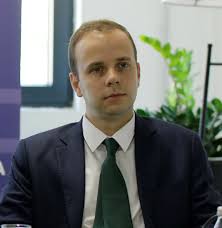
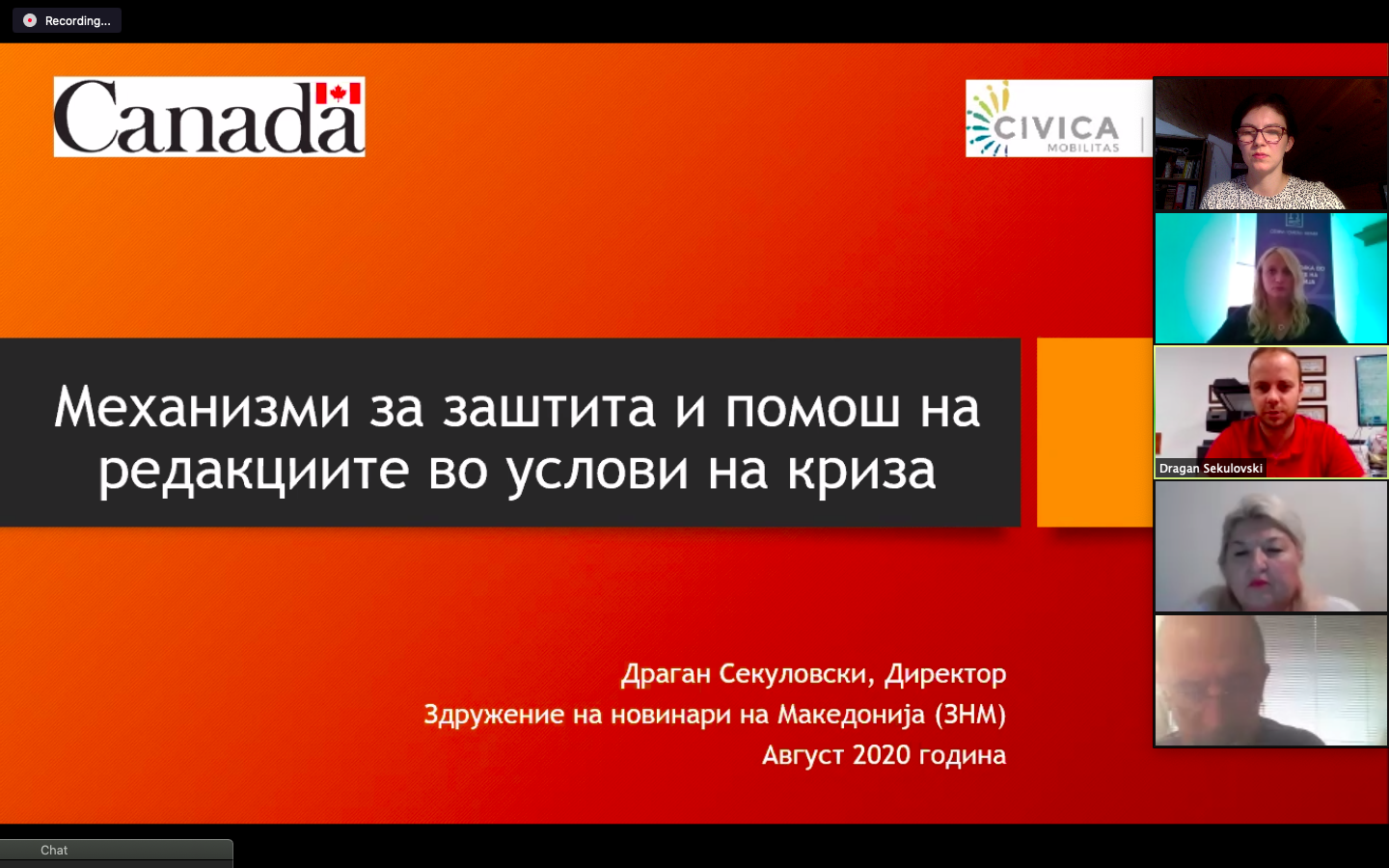 He underlined that at the onset of the crisis, newsrooms were not prepared to work in a pandemics caused crisis (absence of protocols and prior practice). On March 18th, when a state of emergency was declared, some of the newsrooms experienced difficulties in performing their customary duties and obligations in the interest of unbiased reporting.
He underlined that at the onset of the crisis, newsrooms were not prepared to work in a pandemics caused crisis (absence of protocols and prior practice). On March 18th, when a state of emergency was declared, some of the newsrooms experienced difficulties in performing their customary duties and obligations in the interest of unbiased reporting.
According to Mr. Sekulovski, the challenges encountered by the media in the afore-stated crisis were as follows:
- Keeping physical distance (especially in the case of large media)
- Lack of protective equipment and prior practice
- Economic pressure
- Risk of restrictive measures and other regulations imposed by the Government.
As for the journalists themselves, the problems encountered were as follows: their personal safety and safety of their closest family members, infringement of workers’ rights, emotional stress and restricted and curtailed access to information rendered by public institutions.
Mr. Sekulovski classified the protection mechanisms as follows:
- Internal – mechanisms implemented by the media management for the purpose of protecting journalists and media workers from the aspect of any health risks and economic -social assistance.
- Externalmechanisms undertaken by the Government and by other competent institutions, as well as by civil society organizations, the international community, citizens and by the corporate sector aimed to assist media and journalists.
Mr. Sekulovski listed the following examples of internal mechanisms: protocols for safe operation of newsrooms, as well as for field work referring to all employees (medical (protective) equipment, shift work, division in groups, teleworking, guest appearance, special measures aimed at persons affected by chronic diseases, etc.). These measures are also accompanied by adherence to the Law on Labor Relations, intervention measures for economic assistance and collective agreements applicable to working in media – trade union assistance.
As far as the external protection mechanisms are concerned, Mr. Sekulovski listed the following:
- Economic measures adopted by the Government for the purpose of assisting media in circumstances when the fragile media market has already been heavily impacted
- Responsibility on the part of any entities organizing events for media and journalists (observance of protocols)
- Civil society organizations and the international community in education related activities and assistance in the form of equipment, assets and finances.
Mr. Dragan Sekulovski informed the attendees that in the course of the second week of March, CMEM and AJM drafted a publication entitled ‘Guidelines for Safe and Professional Coronavirus Reporting’. This publication was drawn up in the interest of better informed public and safer journalists and media workers when performing their day-to-day professional obligations. The authors of this publication are Ms. Marina Tuneva, the Executive Director of CMEM and Mr. Ognen Janeski, a journalist and alumni researcher from the United Nations Department of Public Information. This publication serves as a handbook for ethical, professional and responsible Coronavirus related reporting in global pandemic conditions. The publication dwells on standard caution measures and reporting recommendations for journalists and media workers in the field. Furthermore, it gives directions for newsroom operation and guest appearance in shows.
Ms. Filana Koka, a journalist from the Macedonian Radio Television discussed the issue of the profession of journalism in crisis conditions.
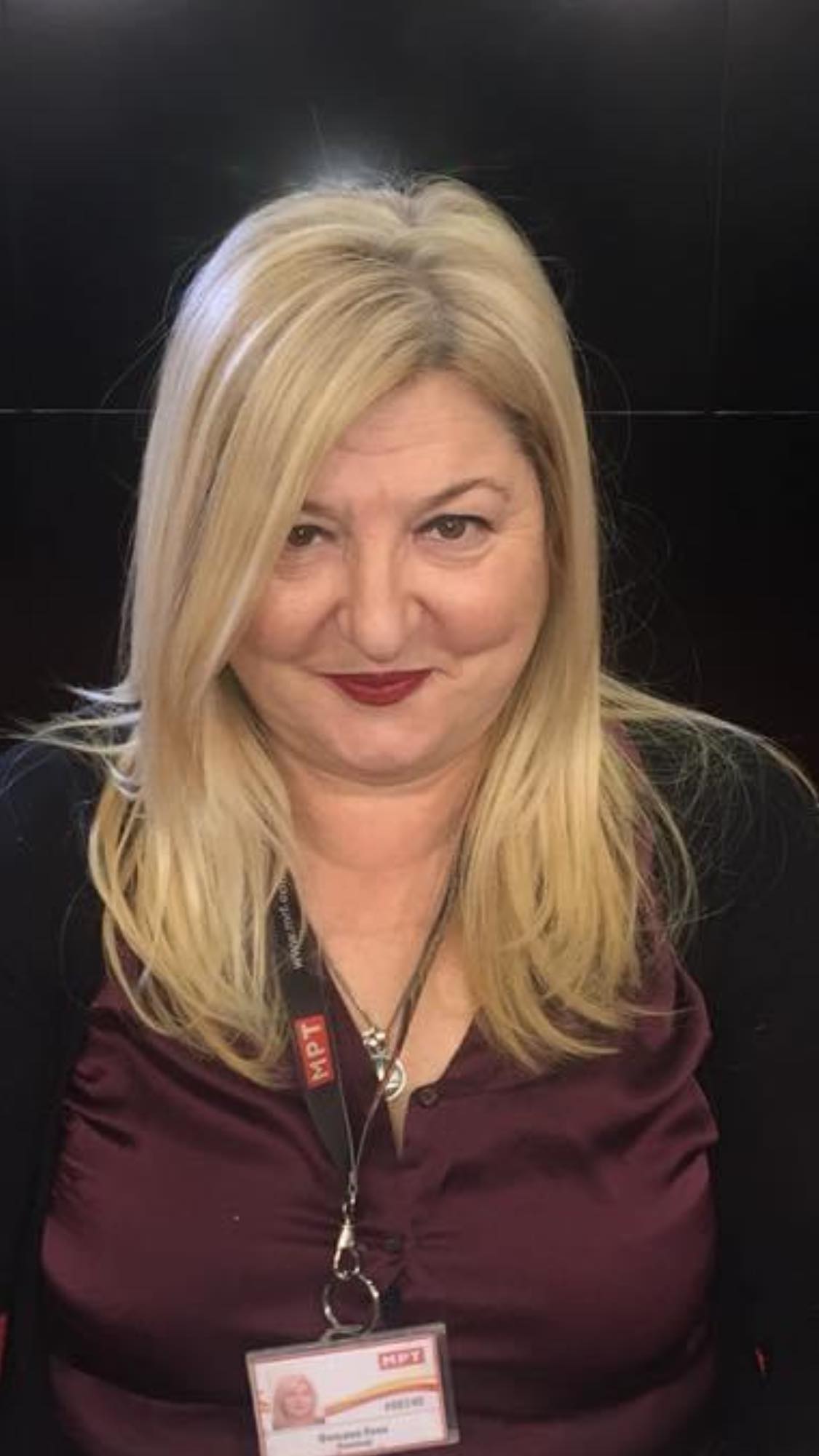
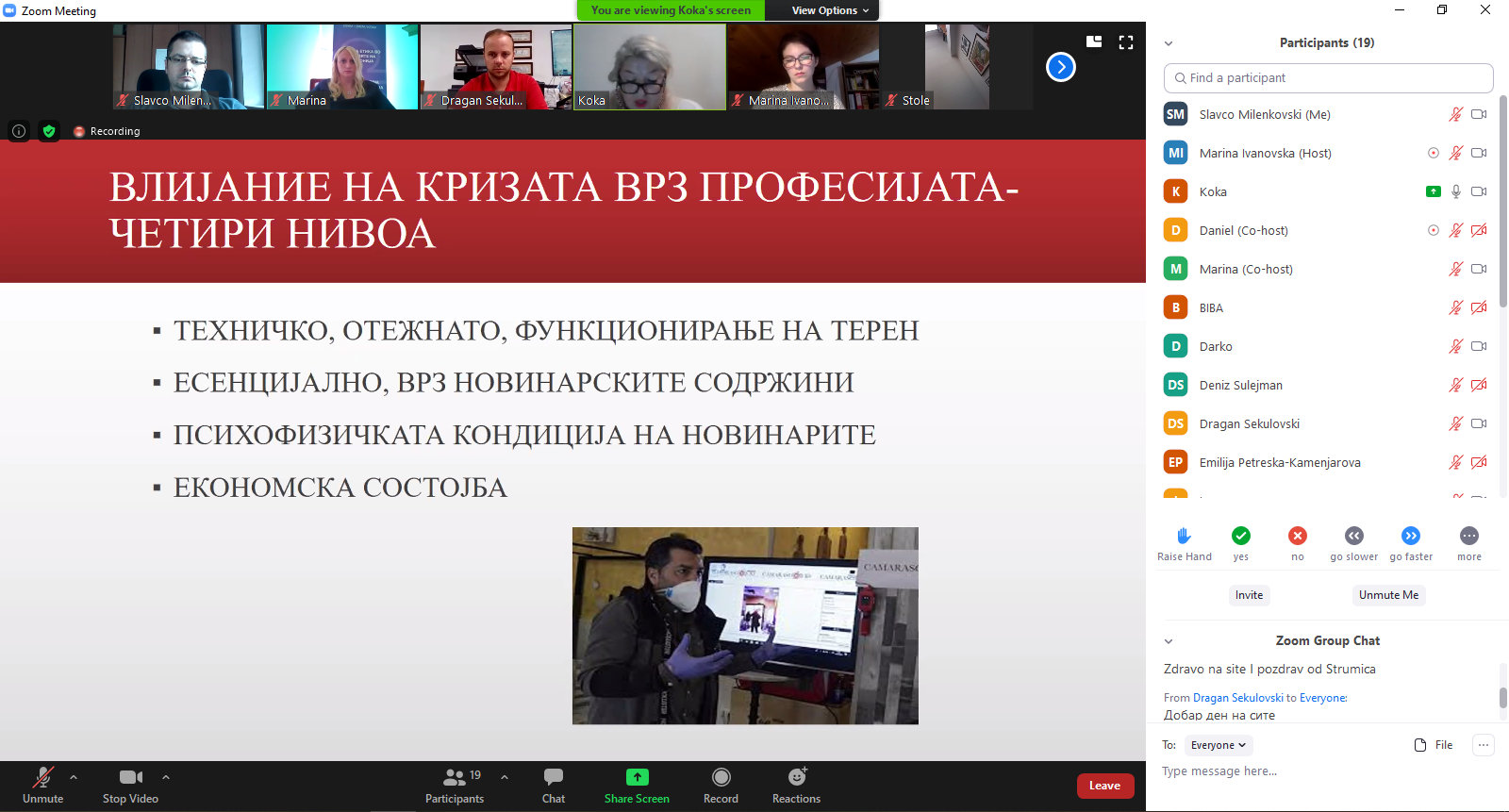 She underlined four levels of crisis impact on the very profession:
She underlined four levels of crisis impact on the very profession:
- Technical (hindered field operation)
- Essential (in terms of news content)
- The psycho-physical condition of journalists
- Economical condition
As Ms. Koka highlighted, the pandemics forced media to resort to new technologies and ways of reporting. In her opinion, this situation was both positive and negative due to the fact that the journalists encountered restrictions in the access to certain information. As far as the sources of information or interlocutors were concerned, Ms. Koka stated that the institutions were not as readily available as before unlike others, such as experts and analysts that were now more accessible due to the use of the new technology. Furthermore, Ms. Filana Koka elaborated on the absence of investigative journalism. Some of the media presented the information as released; some others sought for responses when a given item of news was released checking and looking into at least one more side of the story. According to Ms. Koka, this was the only normal way in fighting disinformation. She emphasized the early parliamentary elections in the country as a particular challenge regarding the pandemics.
According to Ms. Koka, from a technical point of view, a vast amount of energy in media was focused on the manner of organizing the work in studios, newsrooms and on the field. ‘Not only did we have to protect ourselves against the infection but also we had to serve as role models to the public and prove that mask wearing was the best possible solution for the time being. I found this exceptionally hard to say to my fellow colleagues. A large number of them were heavily impacted by the fake news circulating the 5g network sphere or stories of inserting microchips. It was even harder with the fellow colleagues who believed that this was just like any other flu. Imagine how hard it is to reach a colleague who is already convinced in certain lies and to make him educate the public and convey the truth’, said Ms. Koka. Newsrooms were divided into two groups for protection purposes in case a fellow colleague got infected. ‘The very essence of team work, which is the core foundation of journalism, was lost. Videos were received by email and we would get connected from the office. There was no interaction with interlocutors, ministers; holders of public office felt more comfortable in their statements and in press conferences due to the absence of any vigorous interaction that is much more efficient in revealing the truth.’ Ms. Koka pointed out that there was an option of posing questions, but, nonetheless, there were subtle restrictions imposed by the length of conferences and the statements given. ‘All of the afore-said transformed journalism from a very dynamic into a numb profession which was in favour of those who wished to stay aside from the watchful eye of the public’, stated Ms. Koka.
On the other hand, and as explained by the MTV journalist, the pandemics made any other essential topic become trivial and unattractive compared to the Coronavirus topic. ‘Simply, it became a globally predominant theme when it comes to what is most precious – people’s health and lives. The focus was on technical information related to the virus and technical information concerning other areas and issues. The number of investigative stories significantly declined. It was difficult to monitor corruption which can otherwise prosper and flourish especially in the case of such crises’, stated Ms. Koka. The possibility of any due diligence was restrained so as not to spread panic and raise alarm. ‘There were even attempts to prescribe any critical stories to fake news. It was like opening Pandora’s Box when trying to tackle the issue of public procurement, face-to-face tender negotiating, such as the case of procurement of respirators. Would there be a witch hunt if I opted for raising an issue beyond the framework of stipulated reports and announcements? Would I be publicly condemned for raising such issues when people are dying? All in all, we witnessed a journalism collapse’, stated Ms. Filana Koka.
Every time a journalist would be in the field, he/she was exposed to potential infection. ‘Panic may be subdued, but, fear is on the increase. We are working in the public interest and we are to remain professional in securing and presenting accurate and timely information. We cannot achieve this elsewhere, but directly in the field. At the end of the day we come home to our families and we cannot show them how terrifying our past routines have become. The situation heavily impacts our health and is reflected on our dedication to the profession. Apart from this, we are constantly faced with fears for our job security and existence in general.’ The workplaces of a number of journalists were at stake. Even though the Government provided support to media, many of our fellow colleagues lost their jobs. ‘Journalism once more proved to be a very stressful profession and a profession that is generally expected to be realized in the best possible manner. Nonetheless, it does not receive the necessary support on the part of the public or the institutions’, concluded Ms. Koka.
